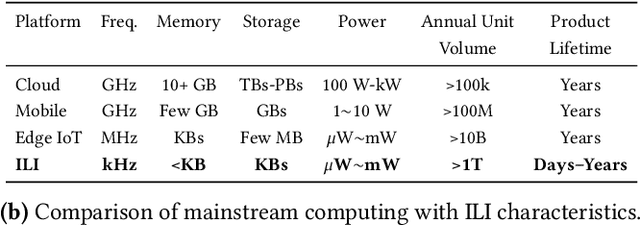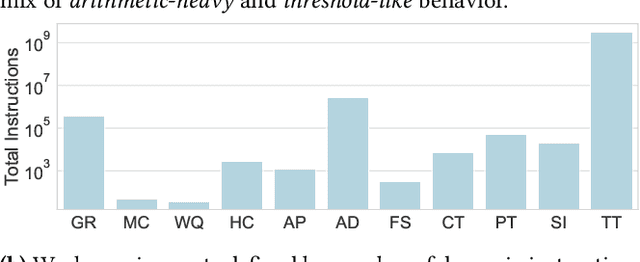Arya Tschand
Lifetime-Aware Design of Item-Level Intelligence
Sep 09, 2025



Abstract:We present FlexiFlow, a lifetime-aware design framework for item-level intelligence (ILI) where computation is integrated directly into disposable products like food packaging and medical patches. Our framework leverages natively flexible electronics which offer significantly lower costs than silicon but are limited to kHz speeds and several thousands of gates. Our insight is that unlike traditional computing with more uniform deployment patterns, ILI applications exhibit 1000X variation in operational lifetime, fundamentally changing optimal architectural design decisions when considering trillion-item deployment scales. To enable holistic design and optimization, we model the trade-offs between embodied carbon footprint and operational carbon footprint based on application-specific lifetimes. The framework includes: (1) FlexiBench, a workload suite targeting sustainability applications from spoilage detection to health monitoring; (2) FlexiBits, area-optimized RISC-V cores with 1/4/8-bit datapaths achieving 2.65X to 3.50X better energy efficiency per workload execution; and (3) a carbon-aware model that selects optimal architectures based on deployment characteristics. We show that lifetime-aware microarchitectural design can reduce carbon footprint by 1.62X, while algorithmic decisions can reduce carbon footprint by 14.5X. We validate our approach through the first tape-out using a PDK for flexible electronics with fully open-source tools, achieving 30.9kHz operation. FlexiFlow enables exploration of computing at the Extreme Edge where conventional design methodologies must be reevaluated to account for new constraints and considerations.
QuArch: A Question-Answering Dataset for AI Agents in Computer Architecture
Jan 06, 2025



Abstract:We introduce QuArch, a dataset of 1500 human-validated question-answer pairs designed to evaluate and enhance language models' understanding of computer architecture. The dataset covers areas including processor design, memory systems, and performance optimization. Our analysis highlights a significant performance gap: the best closed-source model achieves 84% accuracy, while the top small open-source model reaches 72%. We observe notable struggles in memory systems, interconnection networks, and benchmarking. Fine-tuning with QuArch improves small model accuracy by up to 8%, establishing a foundation for advancing AI-driven computer architecture research. The dataset and leaderboard are at https://harvard-edge.github.io/QuArch/.
MLPerf Power: Benchmarking the Energy Efficiency of Machine Learning Systems from μWatts to MWatts for Sustainable AI
Oct 15, 2024



Abstract:Rapid adoption of machine learning (ML) technologies has led to a surge in power consumption across diverse systems, from tiny IoT devices to massive datacenter clusters. Benchmarking the energy efficiency of these systems is crucial for optimization, but presents novel challenges due to the variety of hardware platforms, workload characteristics, and system-level interactions. This paper introduces MLPerf Power, a comprehensive benchmarking methodology with capabilities to evaluate the energy efficiency of ML systems at power levels ranging from microwatts to megawatts. Developed by a consortium of industry professionals from more than 20 organizations, MLPerf Power establishes rules and best practices to ensure comparability across diverse architectures. We use representative workloads from the MLPerf benchmark suite to collect 1,841 reproducible measurements from 60 systems across the entire range of ML deployment scales. Our analysis reveals trade-offs between performance, complexity, and energy efficiency across this wide range of systems, providing actionable insights for designing optimized ML solutions from the smallest edge devices to the largest cloud infrastructures. This work emphasizes the importance of energy efficiency as a key metric in the evaluation and comparison of the ML system, laying the foundation for future research in this critical area. We discuss the implications for developing sustainable AI solutions and standardizing energy efficiency benchmarking for ML systems.
 Add to Chrome
Add to Chrome Add to Firefox
Add to Firefox Add to Edge
Add to Edge